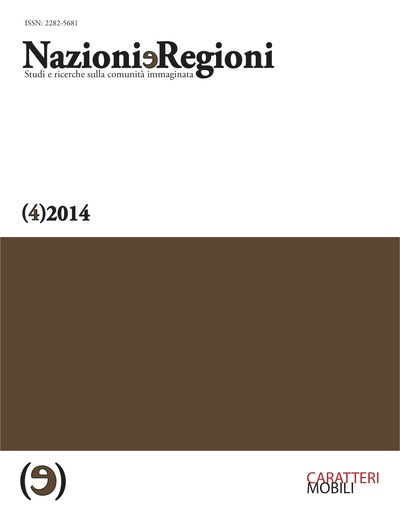La politica del locale. Valori nazionali e politica sociale in Scozia
DOI:
https://doi.org/10.15162/2282-5681/1582Parole chiave:
Devoluzione, identità nazionale, cittadinanza sociale, comunitarismo, devolution, national identity, social citizenship, communitarianismAbstract
А partire dal 1999 la devoluzione ha creato nuovi spazi di divergenza politica all’interno del Regno (sempre più dis-)Unito. Nell’ambito del discorso politico, i «valori nazionali» vengono sistematicamente chiamati in causa per suscitare fedeltà e solidarietà con le «comunità immaginate» (Anderson B., 2000). Il presente articolo riconosce l’eterogeneità presente nelle varie delimitazioni nazionali e l’interconnessione delle quattro nazioni che compongono il Regno Unito. I confronti tra le varie nazioni indicano che le attitudini sociali non divergono in maniera radicale e sono rifratte da specifiche policy communities, istituzioni civiche e sistemi di competizione politica tra partiti a nord e a sud della frontiera anglo-scozzese. I sistemi di sicurezza sociale e i servizi pubblici sono luoghi chiave per la contestazione quando si deve optare tra politiche alternative. Nell’ambito del comunitarismo di centro-sinistra il dibattito sul welfare, sulla coesione sociale e sulla «buona società» fa emergere tensioni irrisolte fra la virtù di una società civile pluralista e le concezioni di «comunità forte» del nazionalismo unionista e di quello secessionista. Da questo punto di vista, il ravvivare la «nazione dei cittadini» (Colley L., 1999) risulta un progetto maggiormente produttivo rispetto al recupero dello stato-nazione.
Devolution from 1999 has created new spaces for policy divergence within the disUniting Kingdom. Within political discourse «national values» are routinely deployed to evoke allegiance and solidarity with «imagined communities» (Anderson B., 1991). This article acknowledges heterogeneity within borders and the interconnectedness of the four nations of the UK. Cross-national comparisons indicate that social attitudes do not diverge radically and are refracted by distinctive policy communities, civic institutions and systems of party political competition north and south. Welfare and public services are key sites of contestation in deliberation on policy alternatives. The debate on welfare, social cohesion and the «good society» raises unresolved tensions within centre-left communitarianism between the virtue of pluralist civil society vis-a-vis notions of «strong community» in both unionist and secessionist nationalism. From this perspective the revivification of the «citizen-nation» (Colley L., 1999) is a more productive project than the recovery of the nation-state.
Riferimenti bibliografici
Group (2013), 2020 Vision: An Agenda for Transformation, Ligatum Institute, London, www.2020conservatives.com/Downloads/20_20_Vision.pdf.
Anderson B. (2000), Comunità immaginate: origini e fortuna dei nazionalismi, trad. it. di M. Vignale, Manifestolibri, Roma [ed. or. 1983].
Arnot M. - Ozga J. (2010), «Education and Nationalism: the Discourse of Education Policy in Scotland», Discourse: Studies in the Cultural Politics of Education, Vol. 31, No. 3, pp. 335-350.
Ball R. – King D. – Eiser D. (2012a), «Replacing the Barnett Formula by Needs Assessment: Lessons from School Funding Formulae in England and Scotland», University of Stirling Working Paper, Stirling, www.barnett-or-needs.stir.ac.uk/documents/educationpaper1Nov2012web_000.pdf.
Ball R. – King D. – Eiser D. (2012b), «Assessing the Relative Health Care Spending Needs of the UK’s Devolved Territories: A Scottish Perspective», Environment and Planning C: Government and Policy, Vol. 30, No. 2, pp. 322-346.
Bell D. – Boyd S. – Bryson A. – Elliott B. – Frizzell E. – Hatchett A. (2012), Public Sector Remuneration in Scotland, David Hume Institute, Edinburgh, http://niesr.ac.uk/sites/default/files/publications/270512_132802.pdf.
Billig M. (1995), Banal Nationalism, Sage, London.
Cable V. (2005), «Multiple Identities. Living with the New Politics of Identity», Demos, London, www.demos.co.uk/files/multipleidentities.pdf.
Centre for Public Policy for Regions (CPPR) (2012), «Scottish Government’s Draft Budget 2013-14, Briefing No. 1, CPPR pre-Budget Briefing», www.cppr.ac.uk/media/media_241748_en.pdf.
Chaney P. (2013), «Equality and Territorial (In-)Justice? Exploring the Impact of Devolution on Social Welfare for Older People in the UK», Critical Social Policy, Vol. 33, No. 1, pp. 114-139.
Christie Commission (2011), Report on Future Delivery of Public Services, www.scotland.gov.uk/Resource/Doc/352649/0118638.pdf.
Colley L. (1999), «Britishness in the 21st Century», Downing Street Millennium Lecture, London School of Economics, London, 8-XII, www.goabroad.net/users/resourcefiles/2007/April/123/admingroup/148285bc39e30e1210604483.pdf.
Colley L. (2009), Britons: Forging the Nation 1707-1837, Yale University Press, New Haven.
Curtice J. – Ormston R. (2011), Is Scotland More Leftwing Than England?, No. 42, 5-XII, NatCen, London, www.natcen.ac.uk/media/788216/scotcen-ssa-report.pdf.
Curtice J. – Ormston R. (2012), «Devolution: On the Road to Divergence? Trends in Public Opinion in Scotland and England», in Park A. – Clery E. – Curtice J. – Phillips M. – Utting D. (eds.), British Social Attitudes 28, Sage, London, pp. 21-36.
Curtice, J. (2013), Who Supports and Opposes Independence – and Why?, ScotCen Social Research, Edinburgh, www.esrc.ac.uk/_images/Who%20supports%20and%20opposes%20independence%20and%20why_tcm8-26113.pdf.
Danson M. – Trebeck K. (2013), No More Excuses. How a Common Weal Approach Can End Poverty in Scotland, The Jimmy Reid Foundation, Biggar http://reidfoundation.org/wp-content/uploads/2013/08/Poverty1.pdf.
Denver D. – Bochel H. – Steven M. (2012), «Mixed Messages for (Some) Parties: the Scottish Council Elections of 2012», Scottish Affairs, No. 80, pp. 1-12.
Diamond P. – Lodge G. (2013), European Welfare States After the Crisis, IPPR, London www.ippr.org/images/media/files/publication/2013/01/Welfare%20States%20after%20the%20Crisis_10272.pdf.
Driver S. – Martell L. (1997), «New Labour’s Communitarianisms», Critical Social Policy, Vol. 17, No. 3, pp. 27-46.
Esping‐Andersen G. (1990), Three Worlds of Welfare Capitalism, Princeton University Press, Princeton NJ.
Featherstone D. – Ince A. – MacKinnon D. – Cumbers A. – Strauss K. (2012), «Progressive Localism and the Construction of Political Alternatives», Transactions of the Institute of British Geographers, Vol. 37, No. 2, pp. 177-182.
Foster R. F. (1989), Cultural Traditions in Northern Ireland: Varieties of Irishness, Dufour Editions, Chester Springs PA.
Gallagher T. (1987), Glasgow: The Uneasy Peace, Manchester University Press, Manchester.
Gallagher T. (2013), Divided Scotland: Ethnic Friction & Christian Crisis, Argyll Publishing, Argyll.
Gamble A. – Wright T. (2009), «Introduction: The Britishness Question», The Political Quarterly, No. 78, pp. 1-9.
Hassan G. (2009), «Don’t Mess with the Missionary Man: Brown, Moral Compasses and the Road to Britishness», The Political Quarterly, No. 87, pp. 86-100.
Hassan G. – Shaw E. (2012), The Strange Death of Labour Scotland, Edinburgh University Press, Edinburgh.
Henderson A. – McEwen N. (2005), «Do Shared Values Underpin National Identity? Examining the Role of Values in National Identity in Canada and the United Kingdom», National Identities, Vol. 7, No. 2, pp. 173-191.
HM Treasury (2013), Public Expenditure Statistical Analyses 2013, Cm 8663, July, HM Treasury, London, www.gov.uk/government/uploads/system/uploads/attachment_data/file/223600/public_expenditure_statistical_analyses_2013.pdf.
Ichijo A. (2012), «Entrenchment of Unionist Nationalism: Devolution and the Discourse of National Identity in Scotland», National Identities, Vol. 14, No. 1, pp. 23-37.
Jeffery C. (2007), «Devolution, Britishness and the Future of the Union», The Political Quarterly, No. 78, pp. 112-121.
Jimmy Reid Foundation (2013), The Common Weal, http://reidfoundation.org/wp-content/uploads/2013/05/The-Common-Weal.pdf.
Keating M. (2009), The Independence of Scotland. Self-Government & the Shifting Politics of Union, Oxford University Press, Oxford.
Keating M. (2004), «Socialism, Territory and the National Question», in Hassan G. (ed.), The Scottish Labour Party. History, Institutions and Ideas, Edinburgh University Press, Edinburgh, pp. 233-247.
King D. – Pashley M. – Ball R. (2004), «An English Assessment of Scotland’s Education Spending Needs», Fiscal Studies, Vol. 25, No. 4, pp. 439-466.
King D. – Pashley M. – Ball R. (2007), «Scotland’s Social Services Spending Needs: An English View», Environment and Planning C: Government and Policy, Vol. 25, No. 6, pp. 918-940.
Law A. – Mooney G. (2012a), «Devolution in a ‘Stateless Nation’: Nation-building and Social Policy in Scotland», Social Policy & Administration, Vol. 46, No. 2, pp. 161-177.
Law A. – Mooney G. (2012b), «Competitive Nationalism: State, Class, and the Forms of Capital in Devolved Scotland’, Environment and Planning C: Government and Policy, Vol. 30, No. 1, pp. 62-77.
Leith M. S. (2012), «The View from Above: Scottish National Identity as an Elite Concept», National Identities, Vol. 14, No. 1, pp. 39-51.
Machin S. – McNally S. – Wyness G. (2013), Education in a Devolved Scotland. A Quantitative Analysis: Report to the Economic and Social Research Council, Centre for Economic Performance, London School of Economics, London, http://cep.lse.ac.uk/pubs/download/special/cepsp30.pdf.
McCartney G. – Collins C. – Walsh D. – Batty D. (2011), Accounting for Scotland’s Excess Mortality: Towards a Synthesis, Glasgow Centre for Population Health, Glasgow, www.gcph.co.uk/assets/0000/1080/GLA147851_Hypothesis_Report__2_.pdf.
McCrone D. (2001), Understanding Scotland. The Sociology of a Nation, Routledge, London [1a ed. 1992].
McCrone D. (2006), «The Same but Different: Why Scotland?», Scottish Affairs, No. 55, pp. 11-22.
Mooney G. (2009), «The ‘Broken Society’ Election: Class Hatred and the Politics of Poverty and Place in Glasgow East», Social Policy and Society, Vol. 8, No. 4, pp. 437-450.
Mycock A. (2012), «SNP, Identity and Citizenship: Reimagining State and Nation», National Identities, Vol. 14, No. 1, pp. 53-69.
National Records of Scotland (2013), 2011 Census: Key Results on Population, Ethnicity, Identity, Language, Religion, Health, Housingand Accommodation in Scotland - Release 2A, www.scotlandscensus.gov.uk/en/news/articles/release2a.html.
Ormston R. – Curtice J. (2007), «Attitudes towards a ‘British Institution’: Comparing Public Views of the NHS in England and Scotland», Scottish Affairs, No. 61, pp. 50-73.
Paterson L. (2002), «Scottish Social Democracy and Blairism: Difference, Diversity and Community», in Hassan G. – Warhurst C. (eds.), Tomorrow’s Scotland, Lawrence & Wishart, London, pp. 116-129.
Phillips D. (2013), Government Spending on Benefits and State Pensions in Scotland: Current Patterns and Future Issues, IFS Briefing Note BN139, July, The Institute for Fiscal Studies, London, www.ifs.org.uk/bns/bn139.pdf.
Pike A. – Tomney J. (2009), «The State and Uneven Development: The Governance of Economic Development in England in the Post-devolution UK», Cambridge Journal of Regions, Economy and Society, Vol. 2, No. 1, pp. 13–34.
Riddell S. – Raffe D. – Croxford L. – Weedon E. – Minty S. (2013), Widening Access to Higher Education: Scotland in UK Comparative Context, Pre-Event Briefing, 8th October, www.esrc.ac.uk/_images/Briefing_TT2_widening%20access_tcm8-28589.pdf.
Rodriguez-Pose A. – Gill N. (2003), «The Global Trend towards Devolution and Its Implications», Environment and Planning C: Government and Policy, Vol. 21, No. 3, pp. 333-351.
Scott G. – Mooney G. (2009), «Poverty and Social Justice in the Devolved Scotland: Neoliberalism Meets Social Democracy?» Social Policy and Society, Vol. 8, No. 3, pp. 379-389.
Scottish Government (2011), The Government Economic Strategy, Scottish Government, Edinburgh, www.scotland.gov.uk/Resource/Doc/357756/0120893.pdf.
Scottish Government (2013), Empowering Scotland: The Government’s Programme for Scotland 2013-14, Scottish Government, Edinburgh,
www.scotland.gov.uk/Resource/0043/00433229.pdf.
Scottish Government National Statistics (2013), Public Sector Employment in Scotland Statistics for the 2nd Quarter 2013, www.scotland.gov.uk/Resource/0043/00433702.pdf.
Select Committee on the Barnett Formula (2009), The Barnett Formula, Authority of the House of Lords, London.
Soule D. – Leith M. – Steven M. (2012), «Scottish Devolution and National Identity», National Identities, Vol. 14, No. 1, pp. 1-10.
Watson D. (2013), «A Case for Encouragement», Scottish Left Review, No. 75, March-April, pp. 14-15.
Downloads
Pubblicato
Fascicolo
Sezione
Licenza
Nazioni e regioni è una rivista open access che applica la licenza Creative Commons CC BY-NC-ND 4.0 a tutti i contenuti pubblicati.
Nazioni e regioni is an open-access journal that applies the Creative Commons CC BY-NC-ND 4.0 licence to all published contents.







